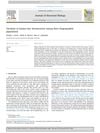 30 citations,
February 2003 in “Annals of Neurology”
30 citations,
February 2003 in “Annals of Neurology” Progesterone and related compounds may help control seizures linked to the menstrual cycle but have limitations that need addressing.
 29 citations,
September 2020 in “International Journal of Molecular Sciences”
29 citations,
September 2020 in “International Journal of Molecular Sciences” The document concludes that freeze-dried platelet-rich plasma shows promise for medical use but requires standardization and further research.
 29 citations,
January 2019 in “Journal of the European Academy of Dermatology and Venereology”
29 citations,
January 2019 in “Journal of the European Academy of Dermatology and Venereology” Trichoscopy is useful for diagnosing and monitoring systemic lupus erythematosus, with certain hair and scalp changes indicating more active disease.
 29 citations,
November 2018 in “Journal of The European Academy of Dermatology and Venereology”
29 citations,
November 2018 in “Journal of The European Academy of Dermatology and Venereology” Personality traits and anxiety affect hair loss patients' quality of life.
 29 citations,
February 2018 in “European Journal of Immunology”
29 citations,
February 2018 in “European Journal of Immunology” Regulatory T cells are essential for normal and improved wound healing in mice.
 29 citations,
June 2017 in “Journal of Inherited Metabolic Disease”
29 citations,
June 2017 in “Journal of Inherited Metabolic Disease” High-content screening is useful for finding new treatments for rare diseases and has led to FDA-approved drugs.
 29 citations,
February 2016 in “International Journal of Dermatology”
29 citations,
February 2016 in “International Journal of Dermatology” People with lichen planus are more likely to have dyslipidemia, especially higher triglyceride levels.
 29 citations,
May 2010 in “Ophthalmology”
29 citations,
May 2010 in “Ophthalmology” Bimatoprost gel makes eyelashes grow longer, but may cause side effects and should be monitored by an eye doctor.
 29 citations,
January 2007 in “American Journal of Clinical Dermatology”
29 citations,
January 2007 in “American Journal of Clinical Dermatology” Eyebrow loss has many causes and requires accurate diagnosis for proper treatment.
 29 citations,
September 1990 in “Biochemical Journal”
29 citations,
September 1990 in “Biochemical Journal” Enzyme purified and characterized for minoxidil sulphation in rat liver.
 28 citations,
November 2018 in “Journal of structural biology”
28 citations,
November 2018 in “Journal of structural biology” Different populations have distinct hair structures related to their ancestry.
 28 citations,
October 2018 in “Clinical Obstetrics and Gynecology”
28 citations,
October 2018 in “Clinical Obstetrics and Gynecology” Testosterone therapy seems safe and effective for transgender men with proper care, but more long-term research is needed.
 28 citations,
January 2015 in “Skin appendage disorders”
28 citations,
January 2015 in “Skin appendage disorders” Children with trichotillomania often pull hair from their scalp, and parents may not notice; stress can trigger it, and asking detailed questions helps in diagnosis and treatment.
 28 citations,
March 2014 in “International Journal of Nanomedicine”
28 citations,
March 2014 in “International Journal of Nanomedicine” New lipid nanoparticles show promise for delivering hair loss treatments but need improvement for better skin penetration.
 28 citations,
May 2013 in “The Journal of Steroid Biochemistry and Molecular Biology”
28 citations,
May 2013 in “The Journal of Steroid Biochemistry and Molecular Biology” Testosterone therapy can improve sexual desire and function in postmenopausal women but should be used cautiously and not based solely on testosterone levels.
 28 citations,
March 2010 in “Histochemistry and cell biology”
28 citations,
March 2010 in “Histochemistry and cell biology” Skin cells can help create early hair-like structures in lab cultures.
 28 citations,
March 2010 in “Clinics in dermatology”
28 citations,
March 2010 in “Clinics in dermatology” Doctors have known about fungal skin infections for a long time, but only made major progress in understanding and treating them since the mid-1800s.
 28 citations,
December 2006 in “Clinical lung cancer”
28 citations,
December 2006 in “Clinical lung cancer” Early recognition and management of skin side effects from new cancer therapies can prevent treatment delays.
 28 citations,
October 1992 in “JEADV. Journal of the European Academy of Dermatology and Venereology/Journal of the European Academy of Dermatology and Venereology”
28 citations,
October 1992 in “JEADV. Journal of the European Academy of Dermatology and Venereology/Journal of the European Academy of Dermatology and Venereology” SIP is a better method for measuring hair growth accurately.
 27 citations,
April 2019 in “Journal of The American Academy of Dermatology”
27 citations,
April 2019 in “Journal of The American Academy of Dermatology” Where melanoma is on the body affects survival chances; melanomas on the back of the head are worse, while those on thighs and arms are less severe, and more sun exposure might improve survival.
 27 citations,
September 2017 in “Journal of Medicinal Food”
27 citations,
September 2017 in “Journal of Medicinal Food” Annurca apple supplement safely increases hair growth and keratin in humans.
 27 citations,
July 2015 in “International Journal of Dermatology”
27 citations,
July 2015 in “International Journal of Dermatology” Every elderly patient had at least one skin condition, often linked to other diseases, highlighting the need for integrated skin and general healthcare in the elderly.
 27 citations,
August 2005 in “The journal of investigative dermatology/Journal of investigative dermatology”
27 citations,
August 2005 in “The journal of investigative dermatology/Journal of investigative dermatology” Researchers found new genes involved in hair growth, which could help develop new hair treatments.
 27 citations,
April 1992 in “Biochemical Journal”
27 citations,
April 1992 in “Biochemical Journal” Minoxidil reduces lysine hydroxylase in skin cells.
 26 citations,
September 2018 in “Colloids and Surfaces B: Biointerfaces”
26 citations,
September 2018 in “Colloids and Surfaces B: Biointerfaces” A new liposome treatment helps heal deep burns on mice by improving hair regrowth and reducing scarring.
 26 citations,
October 2016 in “Biomolecules & Therapeutics”
26 citations,
October 2016 in “Biomolecules & Therapeutics” 3-Deoxysappanchalcone helps human hair cells grow and stimulates hair growth in mice by affecting certain cell signaling pathways.
 26 citations,
October 2011 in “International Journal of Biological Macromolecules”
26 citations,
October 2011 in “International Journal of Biological Macromolecules” Some newly made compounds are promising for treating enlarged prostate, hair loss, viruses, and prostate cancer, and might be better than current drugs.
 26 citations,
November 2009 in “Journal of Endocrinological Investigation”
26 citations,
November 2009 in “Journal of Endocrinological Investigation” Certain gene variations are not a major cause of male infertility in Nigerian men.
 25 citations,
May 2020 in “Stem Cells Translational Medicine”
25 citations,
May 2020 in “Stem Cells Translational Medicine” ADSC-CE treatment safely increases hair density and thickness in androgenetic alopecia patients.
 25 citations,
February 2019 in “Genomics”
25 citations,
February 2019 in “Genomics” Cashmere and milk goats have different hair growth cycles and gene expressions, which could help improve wool production.






























